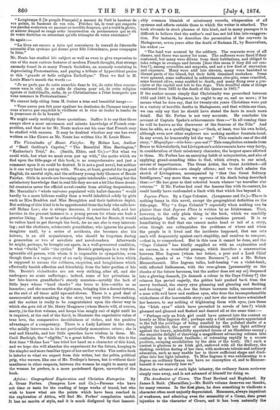Ingram Place. By a Cape Colonist. (Longmans and Co.)—There is
nothing funny in this novel, except the geographical definition on the title-page. Why "a Cape Colonist"? especially when nothing can be Flainer than that Ingram Place is written by an Irishwoman. That., however, is the only plain thing in-the book, which we candidly acknowledge baffles us, after a conscientious perusal. It is so humiliating to find that one cannot make head or tail of a story,. even though one relinquishes the problems of where and when the people in it lived and the incidents happened, that one seta one's will desperately against one's stupidity, and resolves to conquer, —that is, to comprehend. But in this case it cannot be done, and the "Cape Colonist" has kindly supplied us with an explanation and an excuse, in a wonderful passage, which describes a conversation between Miss Ingram (whom her father, a peer and a Lord Chief Justice, speaks of as "the future Baroness "), and a Mr. Rohan Blennerhassett. Miss Ingram talks, half-leaning "on a violet-bank, with affected listlessness, with the rose-gleam [presumably on the cheeks of the future baroness, but the author does not Bay so] deepened into a glowing damask, [is damask a colour in the Cape Colony ?] the crimson lips parted eagerly, the golden hair pushed back from the snowy forehead, the starry eyes gleaming and glancing and flashing and dancing." And oh, how the future baroness talks, unconscious of a man with evil brow and restless eyes, who does the incomprehensible wickedness of the inscrutable story ; and how she must have astonished her hearers, to say nothing of frightening them with eyes, (are these the "Irish eyes" which have prevailed in novels of late ?) which gleamed and glanced and flashed and danced all at the same time :—
"Perhaps only an Irish girl could have entered into the contest so keenly as Miss Ingram did ; perhaps only a Celt could have appreciated to the full the privilege of being assailed by the polished shafts of a mighty intellect, the power of skirmishing with her light artillery against the heavy, splendidly appointed forces of an illustrious enemy ; the exquisite delight of throwing a magnificent advancing column into confusion by a brilliant fusillade ; of retreating rapidly to a secure position, escaping annihilation by the skin of the teeth. Oh such a contest is glorious to an Irish girl, endowed with all the drollery, the dashing, reckless daring of her race, with moderate talents and ordinary education, such as may enable her to throw sufficient shape and disci- pline into her light infantry. To Miss Ingram it was exhilarating to a degree an ordinary Saxon can have no conception of, and to Blenner- hassett it was scarcely less so."
Before the advance of such light infantry, the ordinary Saxon reviewer simply rims away, and is not ashamed of himself for doing so.


































 Previous page
Previous page